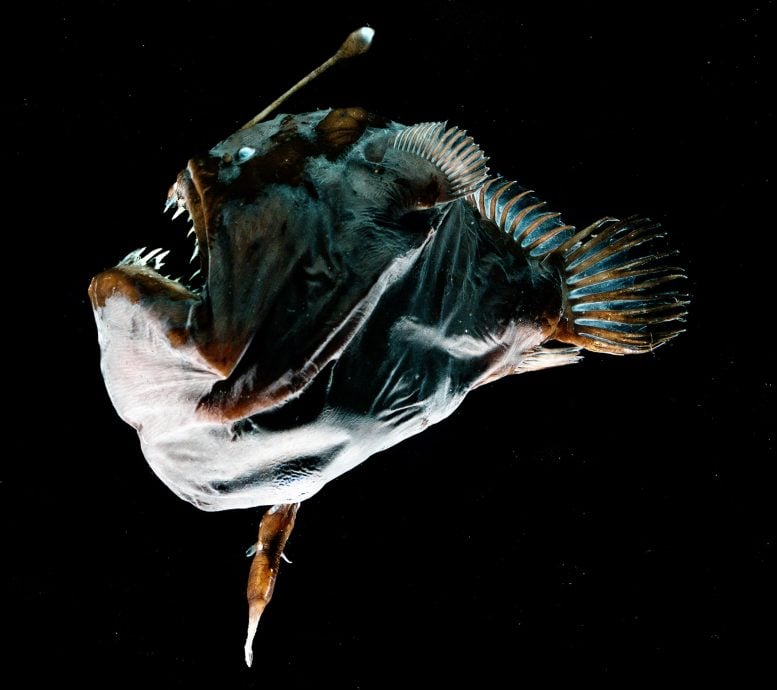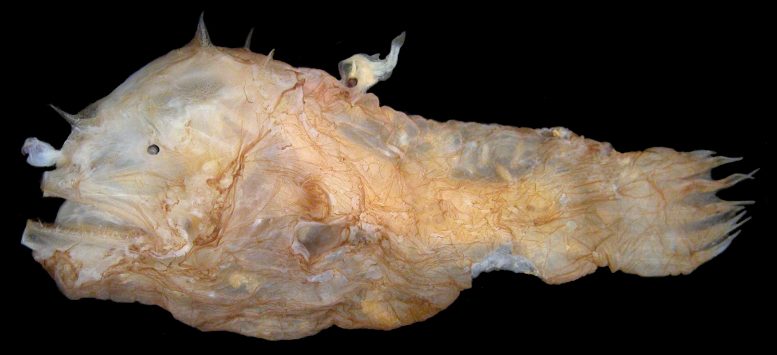
The discovery of altered adaptive immunity in anglerfish helps explain how the creatures are able to temporarily or permanently fuse with their mates without experiencing immune rejection.
For most vertebrates, the loss of the adaptive immune arm — orchestrator of protective T and B cell responses that are considered hallmarks of vertebrate immunity — could be fatal. But for these deep-sea denizens, the protective immune branch could actually stand in the way of reproductive success in the abyss, where finding a mate is so difficult that the animals have evolved a way to fuse tissues — and eventually, circulatory systems — with viable mates once they’ve found them.
A female specimen of the deep-sea anglerfish species Melanocetus johnsonii of about 75 mm in size with a 23.5 mm large male fused on her belly. Credit: Edith A. Widder
To allow for sexual parasitism without harmful effects, it’s possible adaptive immune functions were suppressed in anglerfish and replaced by an alternative form of innate immunity to compensate for the loss, the researchers postulate. This unique immunological shift suggests vertebrate immune systems can be more flexible over time, contrary to the common belief that, once established, neither innate nor adaptive immune systems can be eliminated without catastrophic consequences.
The phenomenon of sexual parasitism in anglerfish has been difficult to investigate, mainly because of the challenge of obtaining either live or dead specimens. Jeremy Swann and colleagues tackled the mystery by grinding up frozen tissue and sequencing DNA from 31 preserved specimens, covering a broad spectrum of non-attaching, temporarily-attaching, and permanently-attaching anglerfish species.

The researchers found that fusion-undergoing species exhibited dramatic changes in the composition and structure of key immune system genes, compared to non-attached species. Species with temporary attaching males lacked functional aicda genes that underpin the maturation of antibodies — a critical process in adaptive immunity. Species known to permanently attach exhibited additional alterations, such as the loss of rag genes, which are essential for the assembly of T cell receptor and antibody genes.
The results suggest that co-evolution of innate and adaptive immunity has been disentangled in anglerfishes to support adoption of sexual parasitism. In the absence of adaptive immunity, modified innate immunity might have helped facilitate the evolutionary success of anglerfish, which remain the most species-rich vertebrate taxon in the deep sea.
In the far future, greater insights into this unique immune system might help inform clinical efforts, such as therapies to enhance innate immunity in immunodeficient patients.
Read Deep-Sea Anglerfish Evolved a New Type of Immune System to Physically Fuse With Their Mates for more on this research.
Reference: “The immunogenetics of sexual parasitism” by Jeremy B. Swann, Stephen J. Holland, Malte Petersen, Theodore W. Pietsch and Thomas Boehm, 30 July 2020, Science.
DOI: 10.1126/science.aaz9445
Never miss a breakthrough: Join the SciTechDaily newsletter.
1 Comment
I swear I just saw this same article pretty much, but published say a week or two earlier? I’m going through the posts from oldest to newest and have noticed several cases where this has occured. Signal boost or are attention spans that bad everywhere 😉